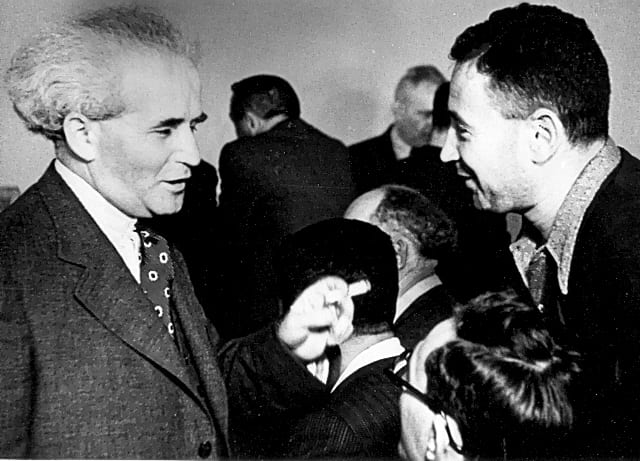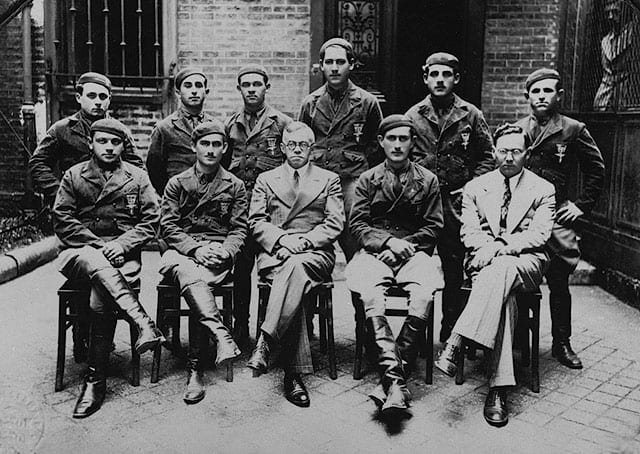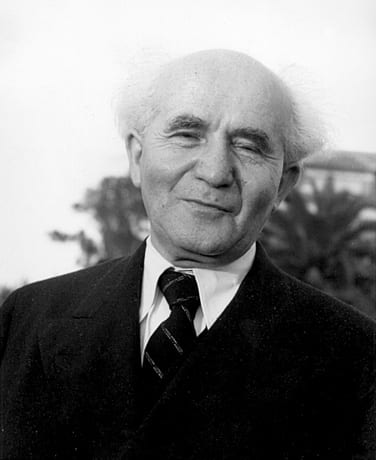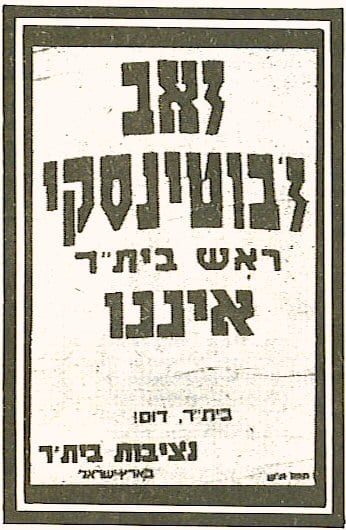Use of Hitler’s accursed name to slam one’s adversaries is not the invention of poets. At least in this sense, Yitzhak Laor is in “good company.” One of the first to drop the German despot’s name for the sake of debasement is none other than Israel’s first prime minister David Ben-Gurion.
A diplomatic genius with prophetic political vision, Ben-Gurion was also vengeful and aggressive. The great leader had four eyes – two to see the present and two the future. Aware of his central role in history, he understood that turning a fleeting aura into eternal glory relied not only on destroying his adversaries but on erasing their heritage. Cliché has it that history is written by the victors – but forgets to add that they not only write but erase the history of their rivals.
Much ink has been spilled in overplaying this subject and the injustice has been rectified to an extent. But if there was one political movement whose historic role Ben-Gurion obsessively sought to erase it was that of the Revisionists and all their descendants. Despite their many virtues – including enlistment in the illegal Aliya during the British Mandate, the Beitar Youth Movement, and participation in the Jewish Resistance Movement – Ben-Gurion strove with all his might to diminish their part in the Zionist enterprise.

Most of all, Ben-Gurion abhorred the Revisionist Movement’s charismatic founder and leader, Ze’ev Jabotinsky. Ben-Gurion called him, “Vladimir Hitler,” in a People’s Meeting in Tel Aviv, also evoking Jabotinsky’s name in Russian, Vladimir. The title of a chapter in a polemic pamphlet that Ben-Gurion penned read, “Jabotinsky in the Footsteps of Hitler.” But most astounding was Ben-Gurion’s loathing of Jabotinsky after his death. As if Ben-Gurion’s campaign slogan “Without Herut [the right wing] and without Maki [the communists],” wasn’t enough – he preferred history without a trace of his bitter rival’s memory. Not even his bones.
“I wish to be buried or cremated (it is the same to me) at the place in which death will find me. My bones if I be buried outside of the Land of Israel, should be transferred to the Land of Israel only at the express order of the Jewish government of that country when it will be established,” Jabotinsky wrote when he was living in Paris in 1935. He died in the US five years later and was buried in the New York Montefiore Cemetery in accordance with his will.
As a leader with a prophetic spirit, Jabotinsky foresaw the founding of the Jewish State. And as a gifted seer with dramatic flair, it seems he also sought to produce a future political drama in which his bones would be transported to Israel “only at the express order of a Jewish government.”

Ben-Gurion fell for this: “The Land needs living Jews – not dead bones,” he said, when MK Mordechai Moruk of the Mizrahi Party proposed to him in 1951 that Jabotinsky’s bones be brought to Israel. Ben-Gurion’s weak argument did not prevent him from approving that the bones of “people who have our good will at heart,” Nahum Sokolow and David Wolfson, be brought to Israel for burial.
The requests continued. In 1952, Professor of Law and Jabotinsky’s former secretary Benjamin Akzin tried his luck. In 1954, then-Interior Minister Israel Rokach of the General Zionist Party made another attempt. Ben-Gurion’s response this time employed a Hebrew rhyming scheme for, “Man originates in ashes and ends in ashes. It is desired and better that he rests where he dies.”
In their book “Memshalot Yisrael Ledoroteihem – Hahlatot Hachamot Vehahlatot” on the wise and stupid decisions of Israel’s governments, Dan Koren and Yechiel Gutman outline the many requests that Ben-Gurion received to bring Jabotinsky’s bones to Israel. Two of them came from Ben-Gurion’s close friends, Israel’s second president Yitzhak Ben-Tzvi and former interior minister Moshe Sharett. But even they failed to sway Ben-Gurion’s opinion. “What will the many graves of foreigners add?” Ben-Gurion responded to Ben-Tzvi’s letter. “Will we bring all the millions of people who died throughout the generations in the Diaspora – including those who are no less important than members of our own generation? For what? Do we need a thing from dead Jews? Let them rest where they are – as long as millions of Jews live in the Diaspora.”

In June 1963, Ben-Gurion resigned from his position as prime minister. His successor, Levi Eshkol, wished to extinguish the flames between the two warring major parties. That paved the way for the transference of Jabotinsky’s bones to Israel. This week, 55 years ago, on the day that Levi Eshkol wed Knesset librarian Miriam Zlikowitz, Menachem Begin attended a meeting with the prime minister, in which he presented Jabotinsky’s will. Eshkol said that he admired Jabotinsky in his youth and asked for time to think. Two days later, he returned to Begin with a positive response.
The coffins of Ze’ev and Yoana Jabotinsky were transported from New York on a plane that stopped in Paris. There a short ceremony was held in the presence of the French prime minister. After the plane landed in Israel, the coffins were placed in Tel Aviv’s Herbert Samuel Square, where a long line of people were waiting to pay their respects to the great Zionist leader. The funeral was held on April 9, 1964. The official burial operation was entitled, “Ze’ev Jabotinsky Returned to the Homeland.” Many dignitaries attended the ceremony: Israel’s former President, then-Speaker of the Knesset, then-deputy president, then-head of the High Court, the chief Rabbis, and of course, Herut Party leader Menachem Begin, who removed Jabotinsky’s sword from his coffin and presented it to the Jabotinsky Institute’s honor guard.

But the retired leader at Kibbutz Sde Boker, Ben-Gurion, did not lay down his sword of enmity. He continued to poke at his adversary’s bones. In a series of articles in the Davar newspaper in 1964, he wrote, “Herut functionaries are trying to organize a people’s funeral by means of the Revisionist ranks. Jabotinsky died 24 years ago, and few in the nation know the true character and deeds of the man whom Begin calls ‘the generation’s teacher,’…Among the means Herut uses to strengthen its influence and prestige is distortion of history. Perhaps it has to do that because, since its creation, it has not contributed a single fruitful project or concept to the strengthening of the State…It relies mainly on ‘the generation’s teacher’ to perform this ‘glorified’ labor of distortion and fabrications. As the wisest of all men [Solomon] said, ‘Love is strong as death.’ But what of hatred? That is apparently much stronger.”